Entrepreneurship and Small Business: Ventures, Impact, and Skills
VerifiedAdded on 2020/06/05
|14
|4074
|132
Report
AI Summary
This report delves into the multifaceted world of entrepreneurship and small business management. It begins by outlining various types of entrepreneurial ventures, including small business ventures, large business entrepreneurship, social entrepreneurship, and lifestyle entrepreneurship, and discusses their typologies. The report then explores the differences and similarities between different types of entrepreneurs, such as men and women entrepreneurs, lifestyle and social entrepreneurs, and agricultural and technical business persons. It also analyzes the impact of micro and small business firms on the economy, highlighting their role as job creators and contributors to economic growth. Furthermore, the report examines the significance of startups and small businesses on the growth of the social economy. Finally, the report identifies and discusses the characteristics, traits, and skills of successful entrepreneurs, emphasizing how entrepreneurial personality reflects motivation and mindset and how background and past experience can foster or hinder entrepreneurship. The report concludes by summarizing the key findings and providing a comprehensive overview of the subject matter.

ENTREPRENEURSHIP AND
SMALL BUSINESS MANAGEMENT
SMALL BUSINESS MANAGEMENT
Paraphrase This Document
Need a fresh take? Get an instant paraphrase of this document with our AI Paraphraser
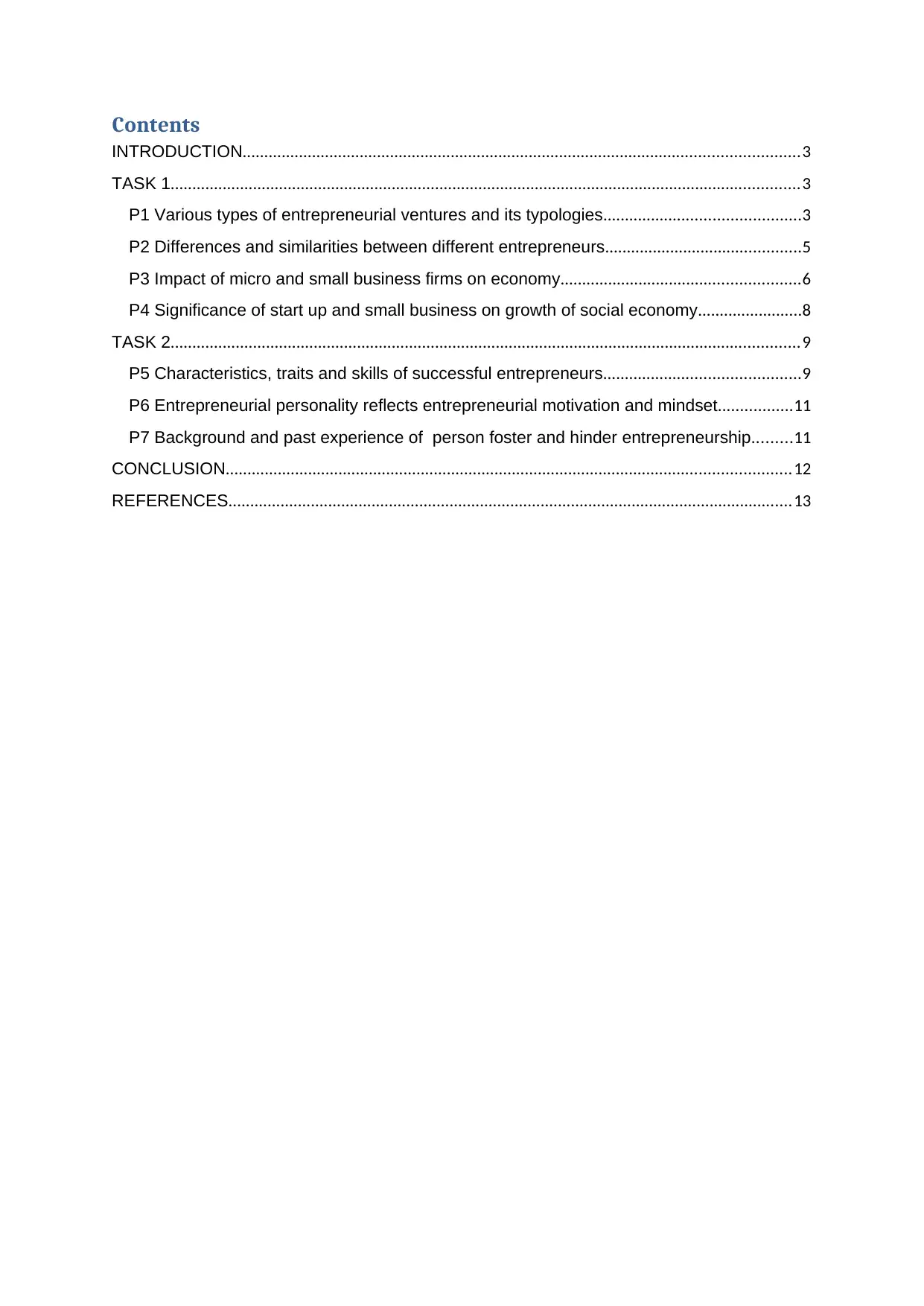
Contents
INTRODUCTION................................................................................................................................3
TASK 1.................................................................................................................................................3
P1 Various types of entrepreneurial ventures and its typologies.............................................3
P2 Differences and similarities between different entrepreneurs.............................................5
P3 Impact of micro and small business firms on economy.......................................................6
P4 Significance of start up and small business on growth of social economy........................8
TASK 2.................................................................................................................................................9
P5 Characteristics, traits and skills of successful entrepreneurs.............................................9
P6 Entrepreneurial personality reflects entrepreneurial motivation and mindset.................11
P7 Background and past experience of person foster and hinder entrepreneurship.........11
CONCLUSION..................................................................................................................................12
REFERENCES..................................................................................................................................13
INTRODUCTION................................................................................................................................3
TASK 1.................................................................................................................................................3
P1 Various types of entrepreneurial ventures and its typologies.............................................3
P2 Differences and similarities between different entrepreneurs.............................................5
P3 Impact of micro and small business firms on economy.......................................................6
P4 Significance of start up and small business on growth of social economy........................8
TASK 2.................................................................................................................................................9
P5 Characteristics, traits and skills of successful entrepreneurs.............................................9
P6 Entrepreneurial personality reflects entrepreneurial motivation and mindset.................11
P7 Background and past experience of person foster and hinder entrepreneurship.........11
CONCLUSION..................................................................................................................................12
REFERENCES..................................................................................................................................13
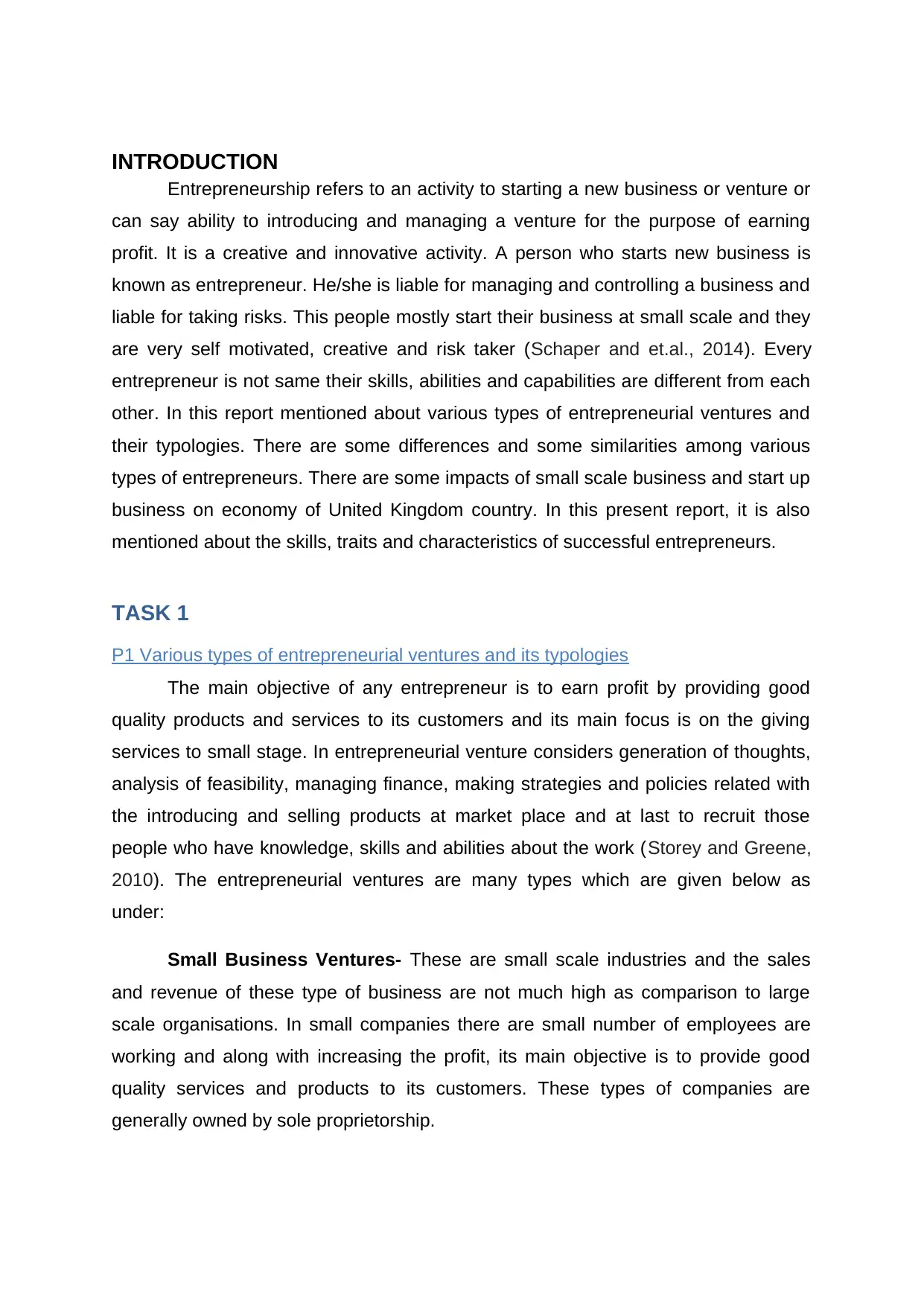
INTRODUCTION
Entrepreneurship refers to an activity to starting a new business or venture or
can say ability to introducing and managing a venture for the purpose of earning
profit. It is a creative and innovative activity. A person who starts new business is
known as entrepreneur. He/she is liable for managing and controlling a business and
liable for taking risks. This people mostly start their business at small scale and they
are very self motivated, creative and risk taker (Schaper and et.al., 2014). Every
entrepreneur is not same their skills, abilities and capabilities are different from each
other. In this report mentioned about various types of entrepreneurial ventures and
their typologies. There are some differences and some similarities among various
types of entrepreneurs. There are some impacts of small scale business and start up
business on economy of United Kingdom country. In this present report, it is also
mentioned about the skills, traits and characteristics of successful entrepreneurs.
TASK 1
P1 Various types of entrepreneurial ventures and its typologies
The main objective of any entrepreneur is to earn profit by providing good
quality products and services to its customers and its main focus is on the giving
services to small stage. In entrepreneurial venture considers generation of thoughts,
analysis of feasibility, managing finance, making strategies and policies related with
the introducing and selling products at market place and at last to recruit those
people who have knowledge, skills and abilities about the work (Storey and Greene,
2010). The entrepreneurial ventures are many types which are given below as
under:
Small Business Ventures- These are small scale industries and the sales
and revenue of these type of business are not much high as comparison to large
scale organisations. In small companies there are small number of employees are
working and along with increasing the profit, its main objective is to provide good
quality services and products to its customers. These types of companies are
generally owned by sole proprietorship.
Entrepreneurship refers to an activity to starting a new business or venture or
can say ability to introducing and managing a venture for the purpose of earning
profit. It is a creative and innovative activity. A person who starts new business is
known as entrepreneur. He/she is liable for managing and controlling a business and
liable for taking risks. This people mostly start their business at small scale and they
are very self motivated, creative and risk taker (Schaper and et.al., 2014). Every
entrepreneur is not same their skills, abilities and capabilities are different from each
other. In this report mentioned about various types of entrepreneurial ventures and
their typologies. There are some differences and some similarities among various
types of entrepreneurs. There are some impacts of small scale business and start up
business on economy of United Kingdom country. In this present report, it is also
mentioned about the skills, traits and characteristics of successful entrepreneurs.
TASK 1
P1 Various types of entrepreneurial ventures and its typologies
The main objective of any entrepreneur is to earn profit by providing good
quality products and services to its customers and its main focus is on the giving
services to small stage. In entrepreneurial venture considers generation of thoughts,
analysis of feasibility, managing finance, making strategies and policies related with
the introducing and selling products at market place and at last to recruit those
people who have knowledge, skills and abilities about the work (Storey and Greene,
2010). The entrepreneurial ventures are many types which are given below as
under:
Small Business Ventures- These are small scale industries and the sales
and revenue of these type of business are not much high as comparison to large
scale organisations. In small companies there are small number of employees are
working and along with increasing the profit, its main objective is to provide good
quality services and products to its customers. These types of companies are
generally owned by sole proprietorship.
⊘ This is a preview!⊘
Do you want full access?
Subscribe today to unlock all pages.

Trusted by 1+ million students worldwide
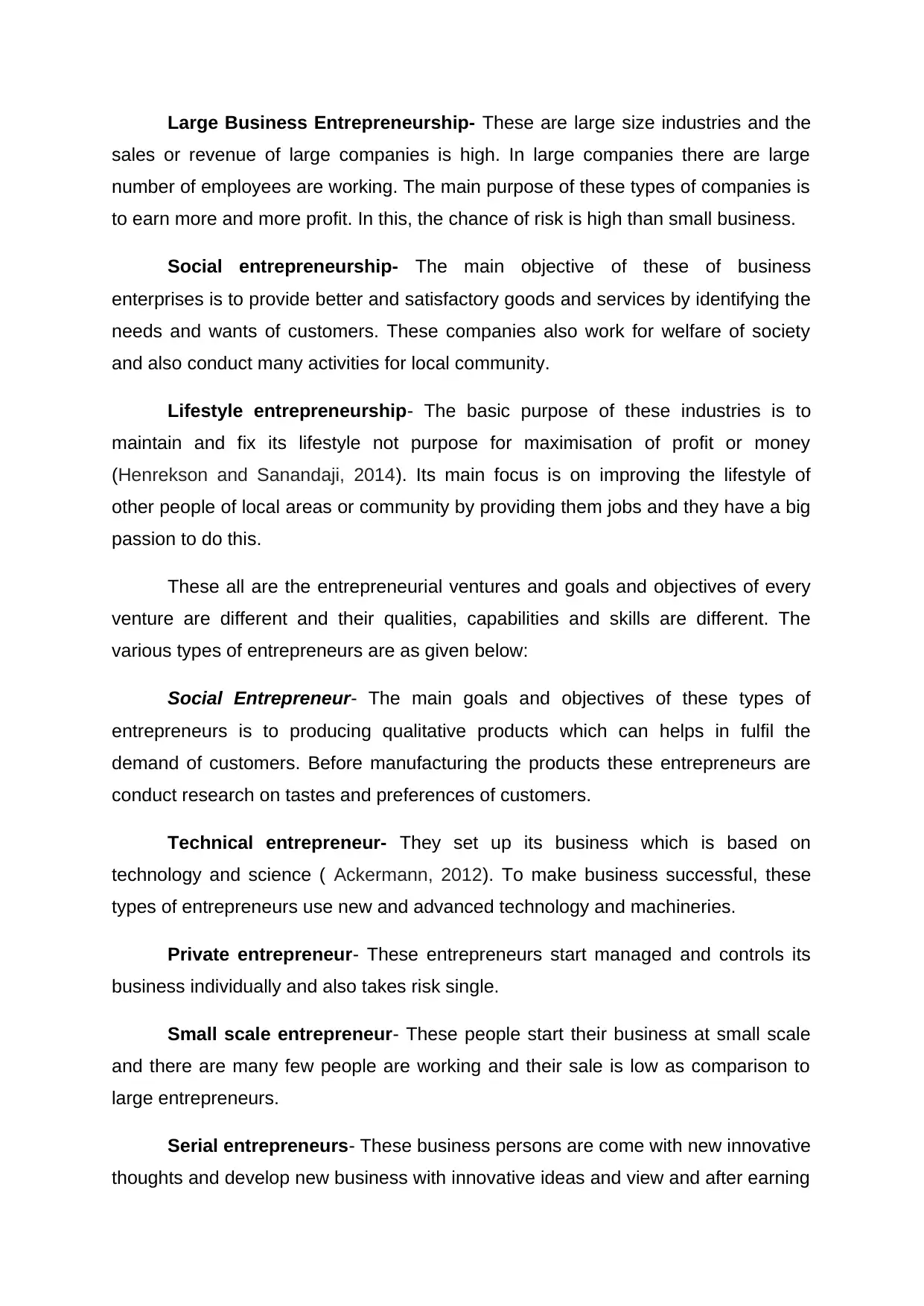
Large Business Entrepreneurship- These are large size industries and the
sales or revenue of large companies is high. In large companies there are large
number of employees are working. The main purpose of these types of companies is
to earn more and more profit. In this, the chance of risk is high than small business.
Social entrepreneurship- The main objective of these of business
enterprises is to provide better and satisfactory goods and services by identifying the
needs and wants of customers. These companies also work for welfare of society
and also conduct many activities for local community.
Lifestyle entrepreneurship- The basic purpose of these industries is to
maintain and fix its lifestyle not purpose for maximisation of profit or money
(Henrekson and Sanandaji, 2014). Its main focus is on improving the lifestyle of
other people of local areas or community by providing them jobs and they have a big
passion to do this.
These all are the entrepreneurial ventures and goals and objectives of every
venture are different and their qualities, capabilities and skills are different. The
various types of entrepreneurs are as given below:
Social Entrepreneur- The main goals and objectives of these types of
entrepreneurs is to producing qualitative products which can helps in fulfil the
demand of customers. Before manufacturing the products these entrepreneurs are
conduct research on tastes and preferences of customers.
Technical entrepreneur- They set up its business which is based on
technology and science ( Ackermann, 2012). To make business successful, these
types of entrepreneurs use new and advanced technology and machineries.
Private entrepreneur- These entrepreneurs start managed and controls its
business individually and also takes risk single.
Small scale entrepreneur- These people start their business at small scale
and there are many few people are working and their sale is low as comparison to
large entrepreneurs.
Serial entrepreneurs- These business persons are come with new innovative
thoughts and develop new business with innovative ideas and view and after earning
sales or revenue of large companies is high. In large companies there are large
number of employees are working. The main purpose of these types of companies is
to earn more and more profit. In this, the chance of risk is high than small business.
Social entrepreneurship- The main objective of these of business
enterprises is to provide better and satisfactory goods and services by identifying the
needs and wants of customers. These companies also work for welfare of society
and also conduct many activities for local community.
Lifestyle entrepreneurship- The basic purpose of these industries is to
maintain and fix its lifestyle not purpose for maximisation of profit or money
(Henrekson and Sanandaji, 2014). Its main focus is on improving the lifestyle of
other people of local areas or community by providing them jobs and they have a big
passion to do this.
These all are the entrepreneurial ventures and goals and objectives of every
venture are different and their qualities, capabilities and skills are different. The
various types of entrepreneurs are as given below:
Social Entrepreneur- The main goals and objectives of these types of
entrepreneurs is to producing qualitative products which can helps in fulfil the
demand of customers. Before manufacturing the products these entrepreneurs are
conduct research on tastes and preferences of customers.
Technical entrepreneur- They set up its business which is based on
technology and science ( Ackermann, 2012). To make business successful, these
types of entrepreneurs use new and advanced technology and machineries.
Private entrepreneur- These entrepreneurs start managed and controls its
business individually and also takes risk single.
Small scale entrepreneur- These people start their business at small scale
and there are many few people are working and their sale is low as comparison to
large entrepreneurs.
Serial entrepreneurs- These business persons are come with new innovative
thoughts and develop new business with innovative ideas and view and after earning
Paraphrase This Document
Need a fresh take? Get an instant paraphrase of this document with our AI Paraphraser
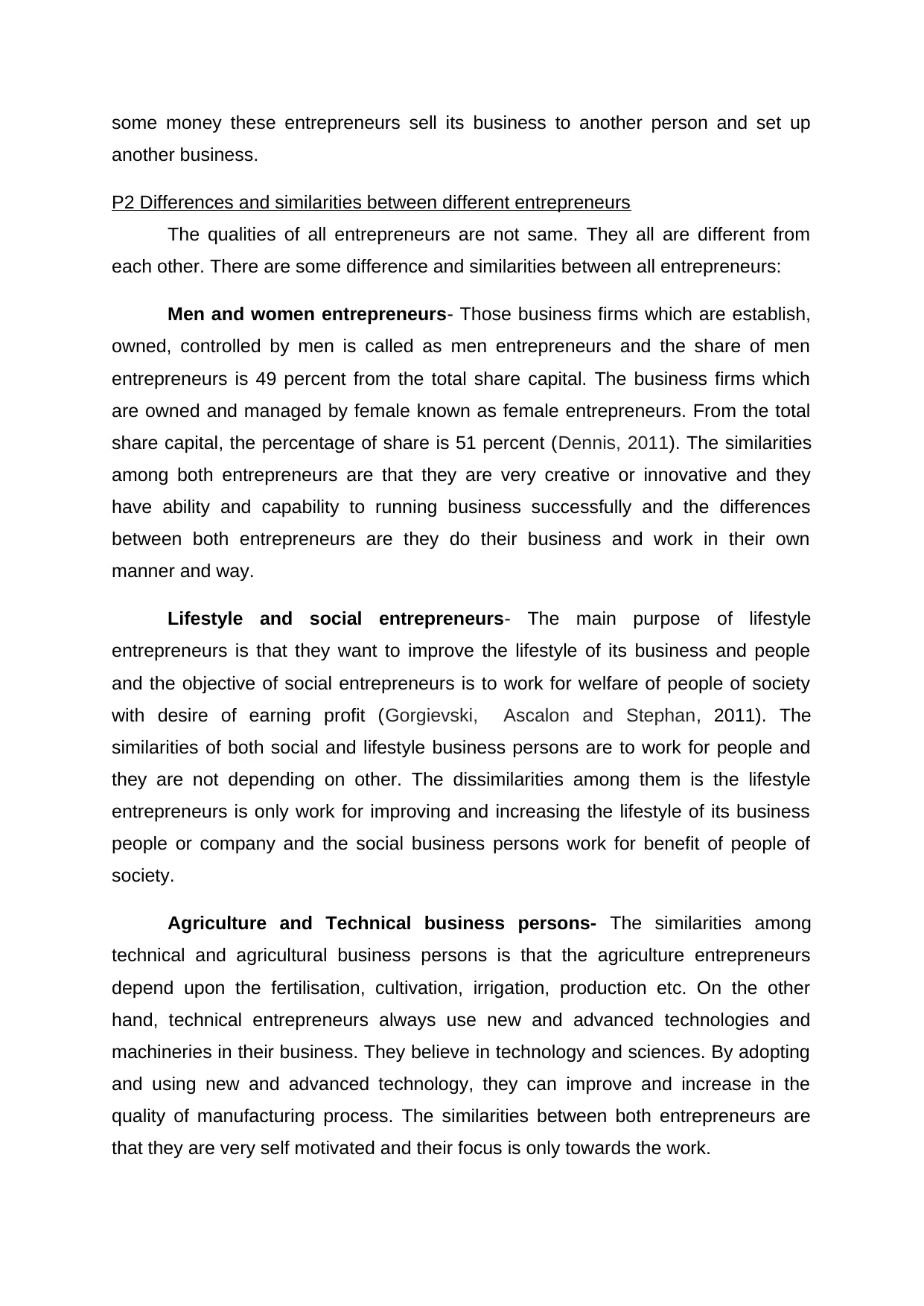
some money these entrepreneurs sell its business to another person and set up
another business.
P2 Differences and similarities between different entrepreneurs
The qualities of all entrepreneurs are not same. They all are different from
each other. There are some difference and similarities between all entrepreneurs:
Men and women entrepreneurs- Those business firms which are establish,
owned, controlled by men is called as men entrepreneurs and the share of men
entrepreneurs is 49 percent from the total share capital. The business firms which
are owned and managed by female known as female entrepreneurs. From the total
share capital, the percentage of share is 51 percent (Dennis, 2011). The similarities
among both entrepreneurs are that they are very creative or innovative and they
have ability and capability to running business successfully and the differences
between both entrepreneurs are they do their business and work in their own
manner and way.
Lifestyle and social entrepreneurs- The main purpose of lifestyle
entrepreneurs is that they want to improve the lifestyle of its business and people
and the objective of social entrepreneurs is to work for welfare of people of society
with desire of earning profit (Gorgievski, Ascalon and Stephan, 2011). The
similarities of both social and lifestyle business persons are to work for people and
they are not depending on other. The dissimilarities among them is the lifestyle
entrepreneurs is only work for improving and increasing the lifestyle of its business
people or company and the social business persons work for benefit of people of
society.
Agriculture and Technical business persons- The similarities among
technical and agricultural business persons is that the agriculture entrepreneurs
depend upon the fertilisation, cultivation, irrigation, production etc. On the other
hand, technical entrepreneurs always use new and advanced technologies and
machineries in their business. They believe in technology and sciences. By adopting
and using new and advanced technology, they can improve and increase in the
quality of manufacturing process. The similarities between both entrepreneurs are
that they are very self motivated and their focus is only towards the work.
another business.
P2 Differences and similarities between different entrepreneurs
The qualities of all entrepreneurs are not same. They all are different from
each other. There are some difference and similarities between all entrepreneurs:
Men and women entrepreneurs- Those business firms which are establish,
owned, controlled by men is called as men entrepreneurs and the share of men
entrepreneurs is 49 percent from the total share capital. The business firms which
are owned and managed by female known as female entrepreneurs. From the total
share capital, the percentage of share is 51 percent (Dennis, 2011). The similarities
among both entrepreneurs are that they are very creative or innovative and they
have ability and capability to running business successfully and the differences
between both entrepreneurs are they do their business and work in their own
manner and way.
Lifestyle and social entrepreneurs- The main purpose of lifestyle
entrepreneurs is that they want to improve the lifestyle of its business and people
and the objective of social entrepreneurs is to work for welfare of people of society
with desire of earning profit (Gorgievski, Ascalon and Stephan, 2011). The
similarities of both social and lifestyle business persons are to work for people and
they are not depending on other. The dissimilarities among them is the lifestyle
entrepreneurs is only work for improving and increasing the lifestyle of its business
people or company and the social business persons work for benefit of people of
society.
Agriculture and Technical business persons- The similarities among
technical and agricultural business persons is that the agriculture entrepreneurs
depend upon the fertilisation, cultivation, irrigation, production etc. On the other
hand, technical entrepreneurs always use new and advanced technologies and
machineries in their business. They believe in technology and sciences. By adopting
and using new and advanced technology, they can improve and increase in the
quality of manufacturing process. The similarities between both entrepreneurs are
that they are very self motivated and their focus is only towards the work.
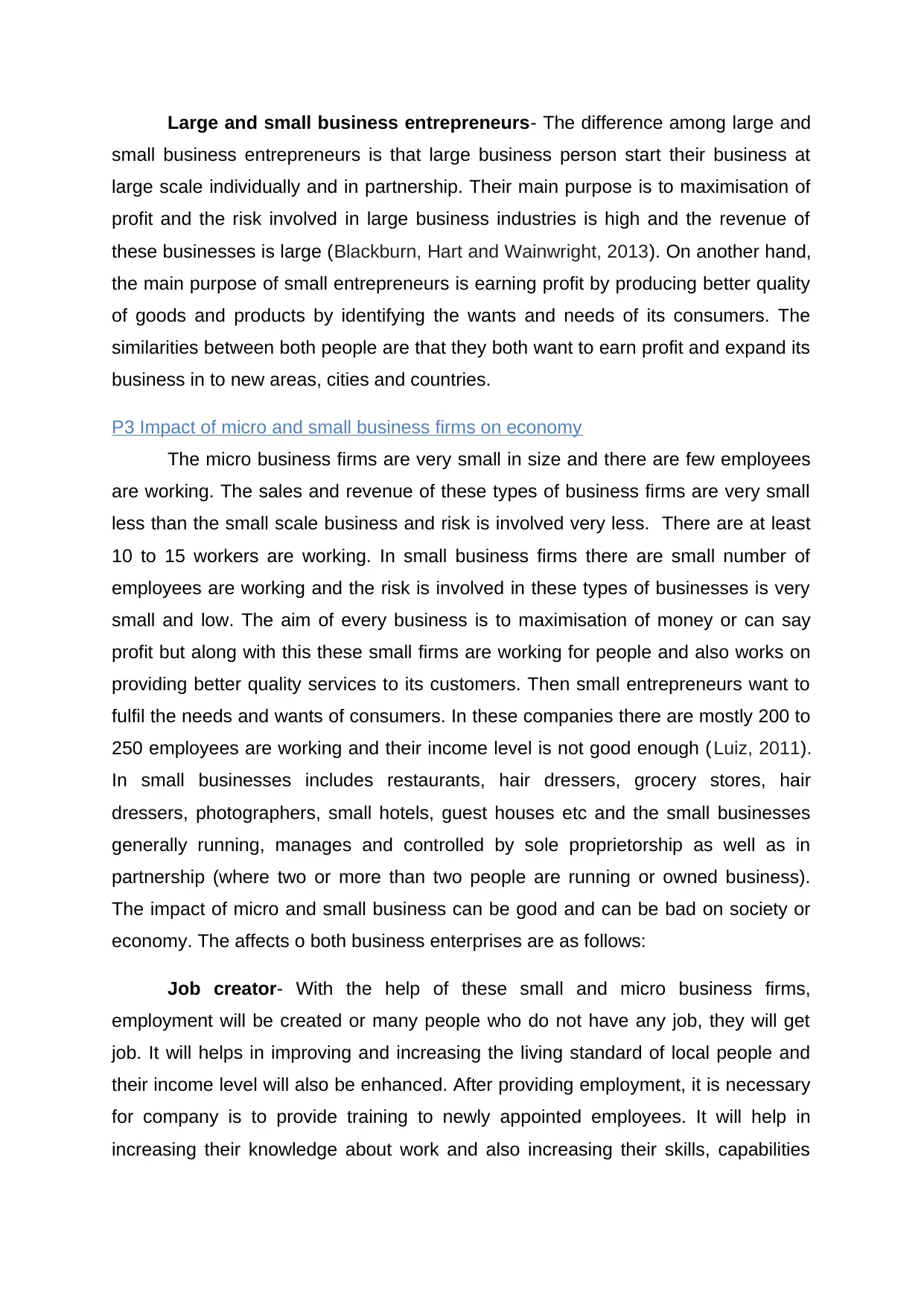
Large and small business entrepreneurs- The difference among large and
small business entrepreneurs is that large business person start their business at
large scale individually and in partnership. Their main purpose is to maximisation of
profit and the risk involved in large business industries is high and the revenue of
these businesses is large (Blackburn, Hart and Wainwright, 2013). On another hand,
the main purpose of small entrepreneurs is earning profit by producing better quality
of goods and products by identifying the wants and needs of its consumers. The
similarities between both people are that they both want to earn profit and expand its
business in to new areas, cities and countries.
P3 Impact of micro and small business firms on economy
The micro business firms are very small in size and there are few employees
are working. The sales and revenue of these types of business firms are very small
less than the small scale business and risk is involved very less. There are at least
10 to 15 workers are working. In small business firms there are small number of
employees are working and the risk is involved in these types of businesses is very
small and low. The aim of every business is to maximisation of money or can say
profit but along with this these small firms are working for people and also works on
providing better quality services to its customers. Then small entrepreneurs want to
fulfil the needs and wants of consumers. In these companies there are mostly 200 to
250 employees are working and their income level is not good enough (Luiz, 2011).
In small businesses includes restaurants, hair dressers, grocery stores, hair
dressers, photographers, small hotels, guest houses etc and the small businesses
generally running, manages and controlled by sole proprietorship as well as in
partnership (where two or more than two people are running or owned business).
The impact of micro and small business can be good and can be bad on society or
economy. The affects o both business enterprises are as follows:
Job creator- With the help of these small and micro business firms,
employment will be created or many people who do not have any job, they will get
job. It will helps in improving and increasing the living standard of local people and
their income level will also be enhanced. After providing employment, it is necessary
for company is to provide training to newly appointed employees. It will help in
increasing their knowledge about work and also increasing their skills, capabilities
small business entrepreneurs is that large business person start their business at
large scale individually and in partnership. Their main purpose is to maximisation of
profit and the risk involved in large business industries is high and the revenue of
these businesses is large (Blackburn, Hart and Wainwright, 2013). On another hand,
the main purpose of small entrepreneurs is earning profit by producing better quality
of goods and products by identifying the wants and needs of its consumers. The
similarities between both people are that they both want to earn profit and expand its
business in to new areas, cities and countries.
P3 Impact of micro and small business firms on economy
The micro business firms are very small in size and there are few employees
are working. The sales and revenue of these types of business firms are very small
less than the small scale business and risk is involved very less. There are at least
10 to 15 workers are working. In small business firms there are small number of
employees are working and the risk is involved in these types of businesses is very
small and low. The aim of every business is to maximisation of money or can say
profit but along with this these small firms are working for people and also works on
providing better quality services to its customers. Then small entrepreneurs want to
fulfil the needs and wants of consumers. In these companies there are mostly 200 to
250 employees are working and their income level is not good enough (Luiz, 2011).
In small businesses includes restaurants, hair dressers, grocery stores, hair
dressers, photographers, small hotels, guest houses etc and the small businesses
generally running, manages and controlled by sole proprietorship as well as in
partnership (where two or more than two people are running or owned business).
The impact of micro and small business can be good and can be bad on society or
economy. The affects o both business enterprises are as follows:
Job creator- With the help of these small and micro business firms,
employment will be created or many people who do not have any job, they will get
job. It will helps in improving and increasing the living standard of local people and
their income level will also be enhanced. After providing employment, it is necessary
for company is to provide training to newly appointed employees. It will help in
increasing their knowledge about work and also increasing their skills, capabilities
⊘ This is a preview!⊘
Do you want full access?
Subscribe today to unlock all pages.

Trusted by 1+ million students worldwide
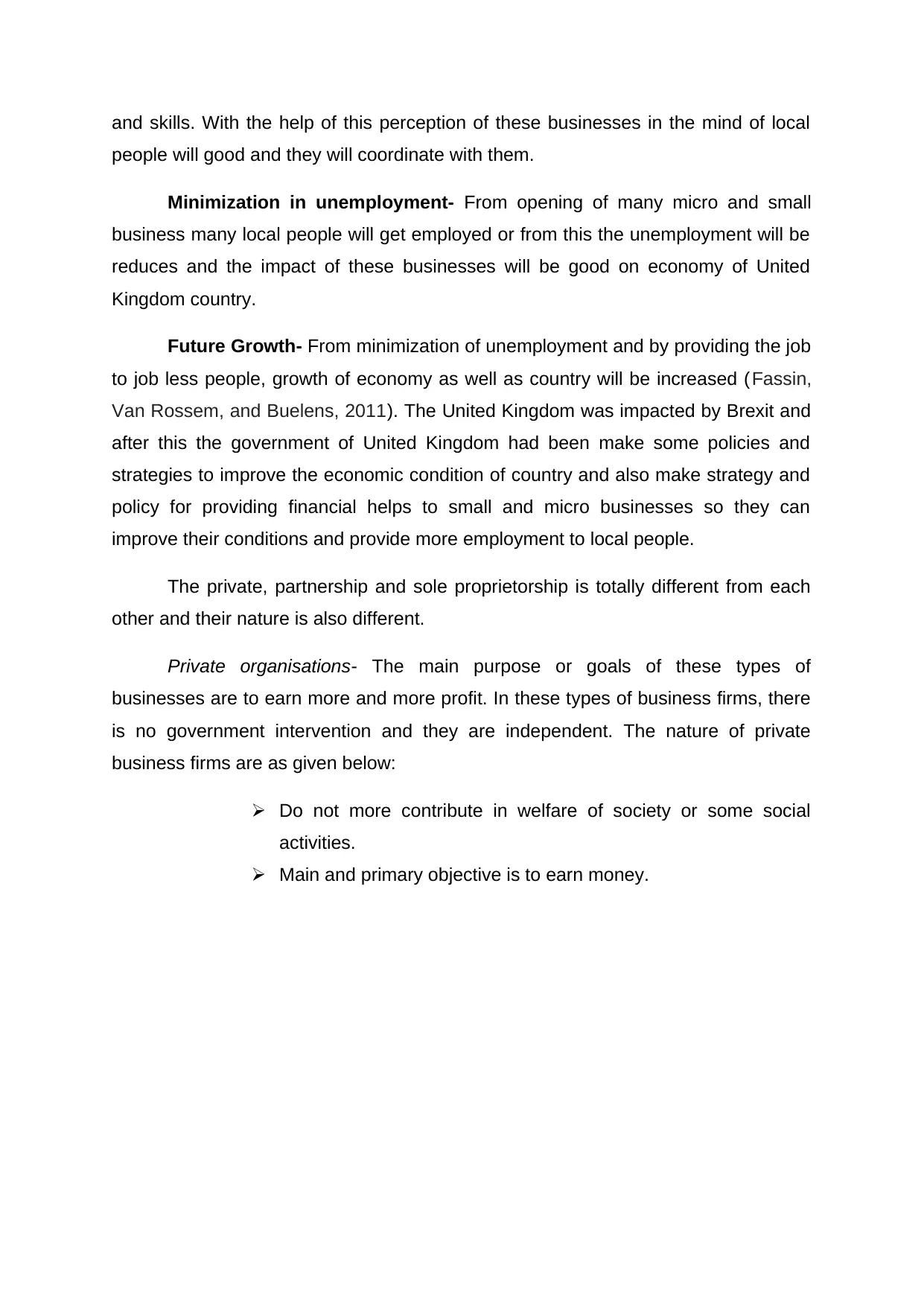
and skills. With the help of this perception of these businesses in the mind of local
people will good and they will coordinate with them.
Minimization in unemployment- From opening of many micro and small
business many local people will get employed or from this the unemployment will be
reduces and the impact of these businesses will be good on economy of United
Kingdom country.
Future Growth- From minimization of unemployment and by providing the job
to job less people, growth of economy as well as country will be increased (Fassin,
Van Rossem, and Buelens, 2011). The United Kingdom was impacted by Brexit and
after this the government of United Kingdom had been make some policies and
strategies to improve the economic condition of country and also make strategy and
policy for providing financial helps to small and micro businesses so they can
improve their conditions and provide more employment to local people.
The private, partnership and sole proprietorship is totally different from each
other and their nature is also different.
Private organisations- The main purpose or goals of these types of
businesses are to earn more and more profit. In these types of business firms, there
is no government intervention and they are independent. The nature of private
business firms are as given below:
Do not more contribute in welfare of society or some social
activities.
Main and primary objective is to earn money.
people will good and they will coordinate with them.
Minimization in unemployment- From opening of many micro and small
business many local people will get employed or from this the unemployment will be
reduces and the impact of these businesses will be good on economy of United
Kingdom country.
Future Growth- From minimization of unemployment and by providing the job
to job less people, growth of economy as well as country will be increased (Fassin,
Van Rossem, and Buelens, 2011). The United Kingdom was impacted by Brexit and
after this the government of United Kingdom had been make some policies and
strategies to improve the economic condition of country and also make strategy and
policy for providing financial helps to small and micro businesses so they can
improve their conditions and provide more employment to local people.
The private, partnership and sole proprietorship is totally different from each
other and their nature is also different.
Private organisations- The main purpose or goals of these types of
businesses are to earn more and more profit. In these types of business firms, there
is no government intervention and they are independent. The nature of private
business firms are as given below:
Do not more contribute in welfare of society or some social
activities.
Main and primary objective is to earn money.
Paraphrase This Document
Need a fresh take? Get an instant paraphrase of this document with our AI Paraphraser
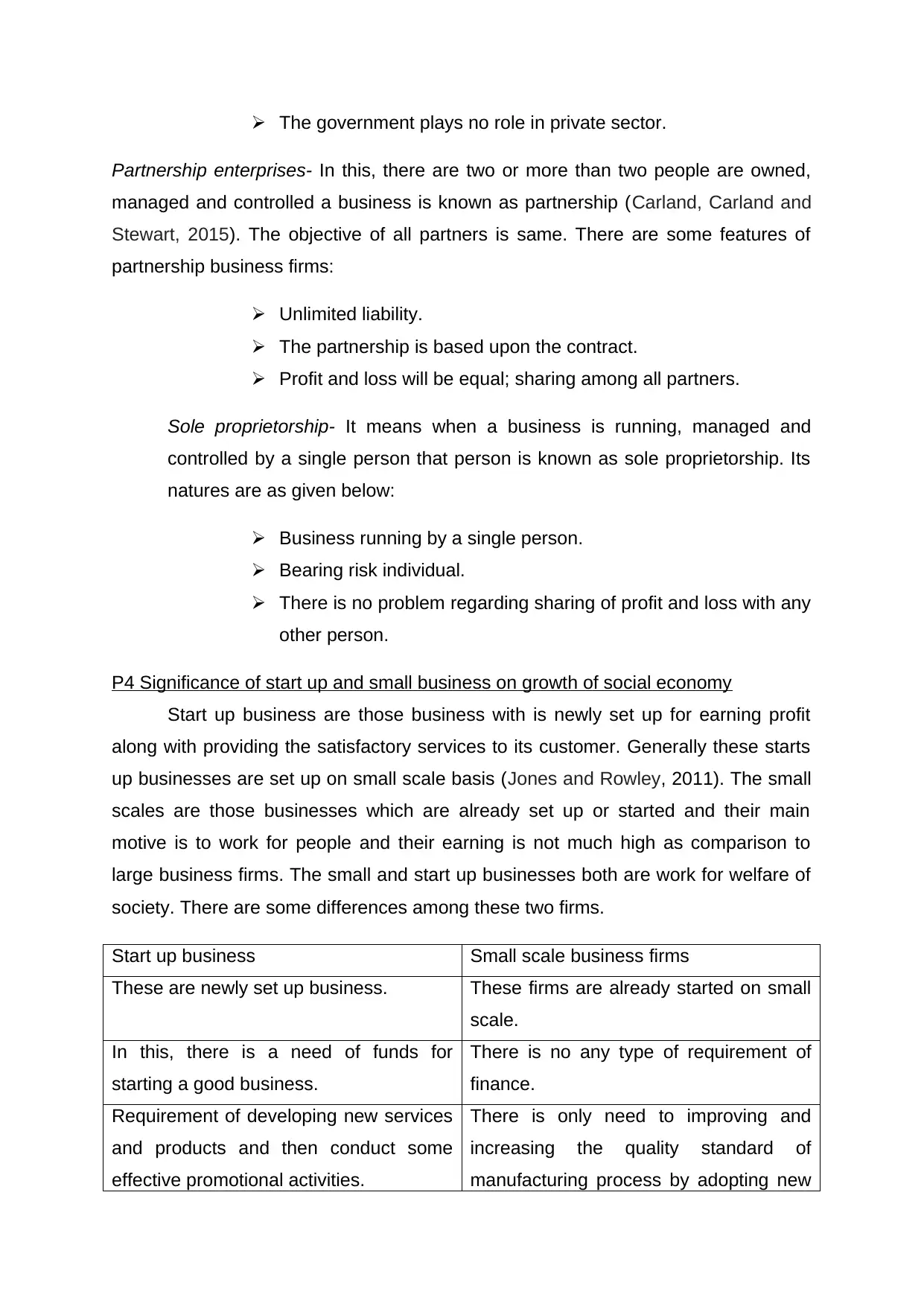
The government plays no role in private sector.
Partnership enterprises- In this, there are two or more than two people are owned,
managed and controlled a business is known as partnership (Carland, Carland and
Stewart, 2015). The objective of all partners is same. There are some features of
partnership business firms:
Unlimited liability.
The partnership is based upon the contract.
Profit and loss will be equal; sharing among all partners.
Sole proprietorship- It means when a business is running, managed and
controlled by a single person that person is known as sole proprietorship. Its
natures are as given below:
Business running by a single person.
Bearing risk individual.
There is no problem regarding sharing of profit and loss with any
other person.
P4 Significance of start up and small business on growth of social economy
Start up business are those business with is newly set up for earning profit
along with providing the satisfactory services to its customer. Generally these starts
up businesses are set up on small scale basis (Jones and Rowley, 2011). The small
scales are those businesses which are already set up or started and their main
motive is to work for people and their earning is not much high as comparison to
large business firms. The small and start up businesses both are work for welfare of
society. There are some differences among these two firms.
Start up business Small scale business firms
These are newly set up business. These firms are already started on small
scale.
In this, there is a need of funds for
starting a good business.
There is no any type of requirement of
finance.
Requirement of developing new services
and products and then conduct some
effective promotional activities.
There is only need to improving and
increasing the quality standard of
manufacturing process by adopting new
Partnership enterprises- In this, there are two or more than two people are owned,
managed and controlled a business is known as partnership (Carland, Carland and
Stewart, 2015). The objective of all partners is same. There are some features of
partnership business firms:
Unlimited liability.
The partnership is based upon the contract.
Profit and loss will be equal; sharing among all partners.
Sole proprietorship- It means when a business is running, managed and
controlled by a single person that person is known as sole proprietorship. Its
natures are as given below:
Business running by a single person.
Bearing risk individual.
There is no problem regarding sharing of profit and loss with any
other person.
P4 Significance of start up and small business on growth of social economy
Start up business are those business with is newly set up for earning profit
along with providing the satisfactory services to its customer. Generally these starts
up businesses are set up on small scale basis (Jones and Rowley, 2011). The small
scales are those businesses which are already set up or started and their main
motive is to work for people and their earning is not much high as comparison to
large business firms. The small and start up businesses both are work for welfare of
society. There are some differences among these two firms.
Start up business Small scale business firms
These are newly set up business. These firms are already started on small
scale.
In this, there is a need of funds for
starting a good business.
There is no any type of requirement of
finance.
Requirement of developing new services
and products and then conduct some
effective promotional activities.
There is only need to improving and
increasing the quality standard of
manufacturing process by adopting new
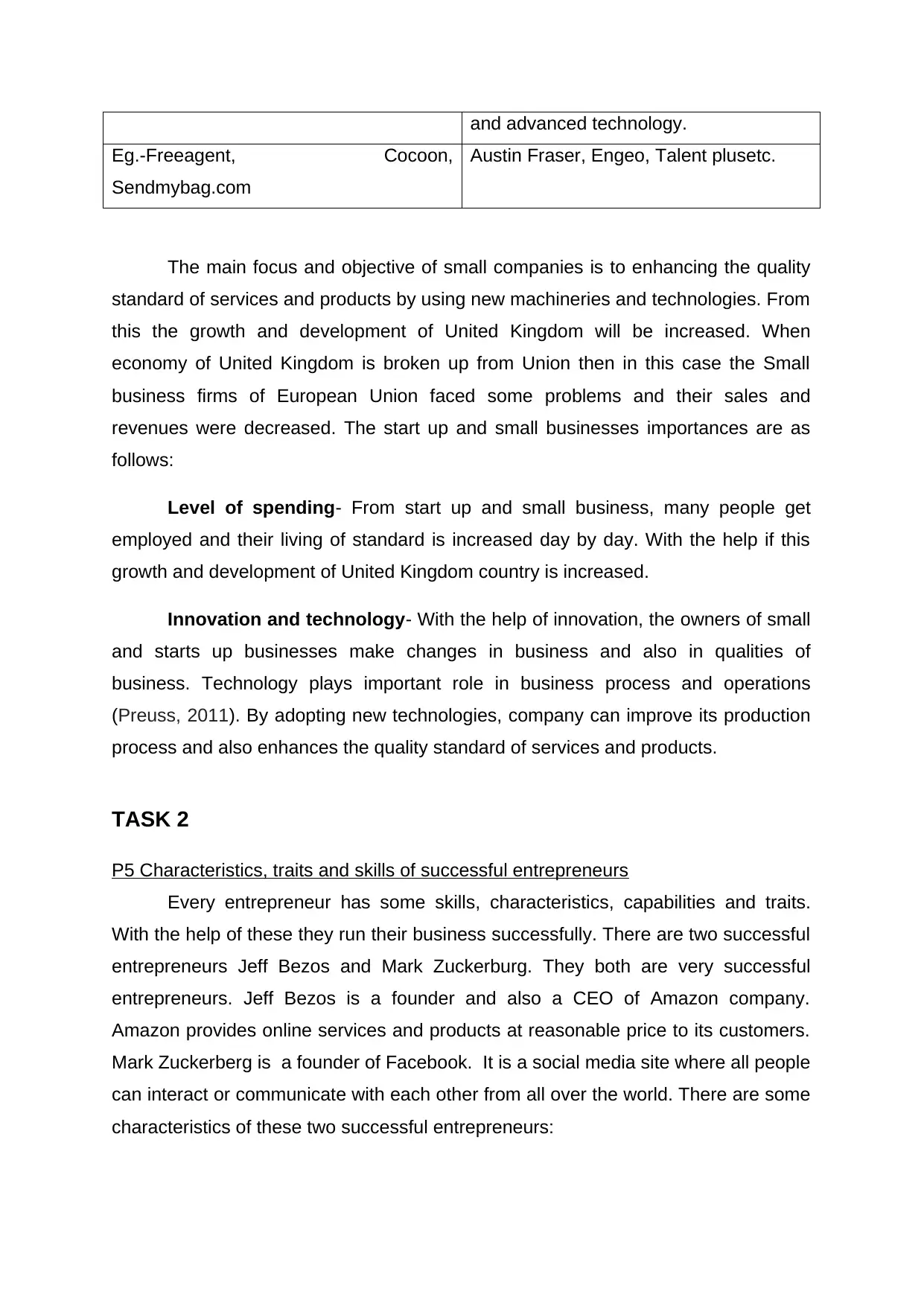
and advanced technology.
Eg.-Freeagent, Cocoon,
Sendmybag.com
Austin Fraser, Engeo, Talent plusetc.
The main focus and objective of small companies is to enhancing the quality
standard of services and products by using new machineries and technologies. From
this the growth and development of United Kingdom will be increased. When
economy of United Kingdom is broken up from Union then in this case the Small
business firms of European Union faced some problems and their sales and
revenues were decreased. The start up and small businesses importances are as
follows:
Level of spending- From start up and small business, many people get
employed and their living of standard is increased day by day. With the help if this
growth and development of United Kingdom country is increased.
Innovation and technology- With the help of innovation, the owners of small
and starts up businesses make changes in business and also in qualities of
business. Technology plays important role in business process and operations
(Preuss, 2011). By adopting new technologies, company can improve its production
process and also enhances the quality standard of services and products.
TASK 2
P5 Characteristics, traits and skills of successful entrepreneurs
Every entrepreneur has some skills, characteristics, capabilities and traits.
With the help of these they run their business successfully. There are two successful
entrepreneurs Jeff Bezos and Mark Zuckerburg. They both are very successful
entrepreneurs. Jeff Bezos is a founder and also a CEO of Amazon company.
Amazon provides online services and products at reasonable price to its customers.
Mark Zuckerberg is a founder of Facebook. It is a social media site where all people
can interact or communicate with each other from all over the world. There are some
characteristics of these two successful entrepreneurs:
Eg.-Freeagent, Cocoon,
Sendmybag.com
Austin Fraser, Engeo, Talent plusetc.
The main focus and objective of small companies is to enhancing the quality
standard of services and products by using new machineries and technologies. From
this the growth and development of United Kingdom will be increased. When
economy of United Kingdom is broken up from Union then in this case the Small
business firms of European Union faced some problems and their sales and
revenues were decreased. The start up and small businesses importances are as
follows:
Level of spending- From start up and small business, many people get
employed and their living of standard is increased day by day. With the help if this
growth and development of United Kingdom country is increased.
Innovation and technology- With the help of innovation, the owners of small
and starts up businesses make changes in business and also in qualities of
business. Technology plays important role in business process and operations
(Preuss, 2011). By adopting new technologies, company can improve its production
process and also enhances the quality standard of services and products.
TASK 2
P5 Characteristics, traits and skills of successful entrepreneurs
Every entrepreneur has some skills, characteristics, capabilities and traits.
With the help of these they run their business successfully. There are two successful
entrepreneurs Jeff Bezos and Mark Zuckerburg. They both are very successful
entrepreneurs. Jeff Bezos is a founder and also a CEO of Amazon company.
Amazon provides online services and products at reasonable price to its customers.
Mark Zuckerberg is a founder of Facebook. It is a social media site where all people
can interact or communicate with each other from all over the world. There are some
characteristics of these two successful entrepreneurs:
⊘ This is a preview!⊘
Do you want full access?
Subscribe today to unlock all pages.

Trusted by 1+ million students worldwide
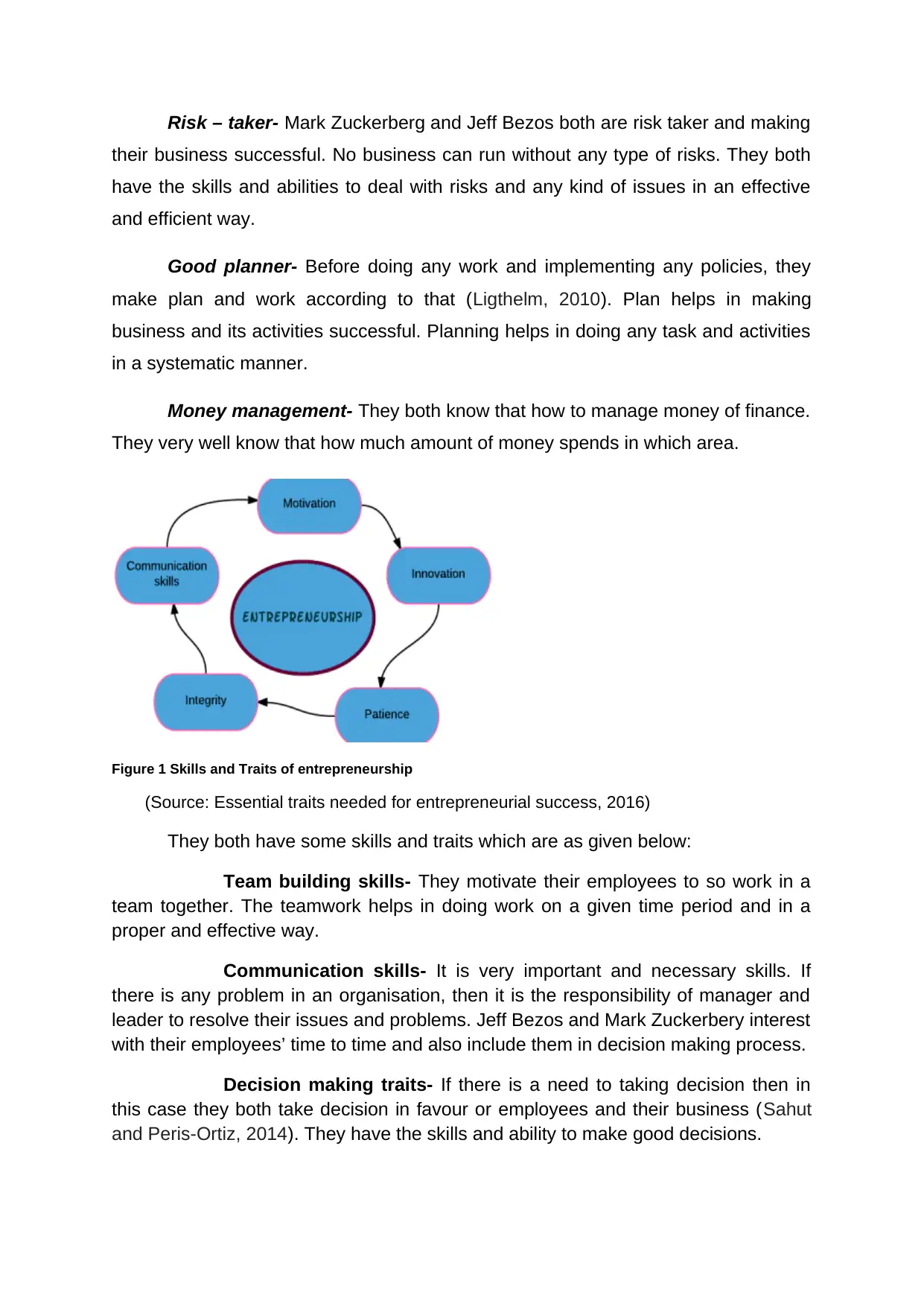
Risk – taker- Mark Zuckerberg and Jeff Bezos both are risk taker and making
their business successful. No business can run without any type of risks. They both
have the skills and abilities to deal with risks and any kind of issues in an effective
and efficient way.
Good planner- Before doing any work and implementing any policies, they
make plan and work according to that (Ligthelm, 2010). Plan helps in making
business and its activities successful. Planning helps in doing any task and activities
in a systematic manner.
Money management- They both know that how to manage money of finance.
They very well know that how much amount of money spends in which area.
Figure 1 Skills and Traits of entrepreneurship
(Source: Essential traits needed for entrepreneurial success, 2016)
They both have some skills and traits which are as given below:
Team building skills- They motivate their employees to so work in a
team together. The teamwork helps in doing work on a given time period and in a
proper and effective way.
Communication skills- It is very important and necessary skills. If
there is any problem in an organisation, then it is the responsibility of manager and
leader to resolve their issues and problems. Jeff Bezos and Mark Zuckerbery interest
with their employees’ time to time and also include them in decision making process.
Decision making traits- If there is a need to taking decision then in
this case they both take decision in favour or employees and their business (Sahut
and Peris-Ortiz, 2014). They have the skills and ability to make good decisions.
their business successful. No business can run without any type of risks. They both
have the skills and abilities to deal with risks and any kind of issues in an effective
and efficient way.
Good planner- Before doing any work and implementing any policies, they
make plan and work according to that (Ligthelm, 2010). Plan helps in making
business and its activities successful. Planning helps in doing any task and activities
in a systematic manner.
Money management- They both know that how to manage money of finance.
They very well know that how much amount of money spends in which area.
Figure 1 Skills and Traits of entrepreneurship
(Source: Essential traits needed for entrepreneurial success, 2016)
They both have some skills and traits which are as given below:
Team building skills- They motivate their employees to so work in a
team together. The teamwork helps in doing work on a given time period and in a
proper and effective way.
Communication skills- It is very important and necessary skills. If
there is any problem in an organisation, then it is the responsibility of manager and
leader to resolve their issues and problems. Jeff Bezos and Mark Zuckerbery interest
with their employees’ time to time and also include them in decision making process.
Decision making traits- If there is a need to taking decision then in
this case they both take decision in favour or employees and their business (Sahut
and Peris-Ortiz, 2014). They have the skills and ability to make good decisions.
Paraphrase This Document
Need a fresh take? Get an instant paraphrase of this document with our AI Paraphraser
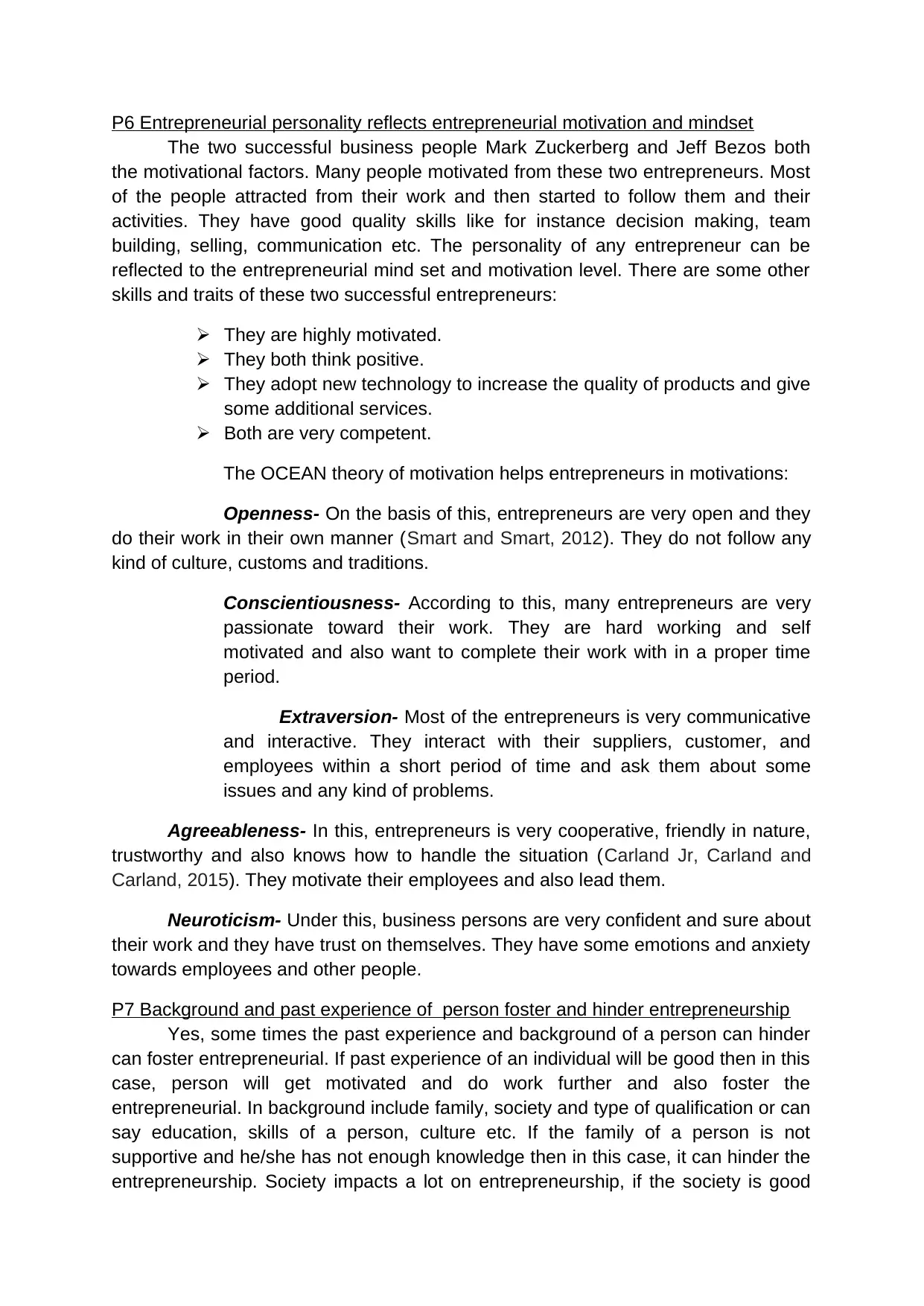
P6 Entrepreneurial personality reflects entrepreneurial motivation and mindset
The two successful business people Mark Zuckerberg and Jeff Bezos both
the motivational factors. Many people motivated from these two entrepreneurs. Most
of the people attracted from their work and then started to follow them and their
activities. They have good quality skills like for instance decision making, team
building, selling, communication etc. The personality of any entrepreneur can be
reflected to the entrepreneurial mind set and motivation level. There are some other
skills and traits of these two successful entrepreneurs:
They are highly motivated.
They both think positive.
They adopt new technology to increase the quality of products and give
some additional services.
Both are very competent.
The OCEAN theory of motivation helps entrepreneurs in motivations:
Openness- On the basis of this, entrepreneurs are very open and they
do their work in their own manner (Smart and Smart, 2012). They do not follow any
kind of culture, customs and traditions.
Conscientiousness- According to this, many entrepreneurs are very
passionate toward their work. They are hard working and self
motivated and also want to complete their work with in a proper time
period.
Extraversion- Most of the entrepreneurs is very communicative
and interactive. They interact with their suppliers, customer, and
employees within a short period of time and ask them about some
issues and any kind of problems.
Agreeableness- In this, entrepreneurs is very cooperative, friendly in nature,
trustworthy and also knows how to handle the situation (Carland Jr, Carland and
Carland, 2015). They motivate their employees and also lead them.
Neuroticism- Under this, business persons are very confident and sure about
their work and they have trust on themselves. They have some emotions and anxiety
towards employees and other people.
P7 Background and past experience of person foster and hinder entrepreneurship
Yes, some times the past experience and background of a person can hinder
can foster entrepreneurial. If past experience of an individual will be good then in this
case, person will get motivated and do work further and also foster the
entrepreneurial. In background include family, society and type of qualification or can
say education, skills of a person, culture etc. If the family of a person is not
supportive and he/she has not enough knowledge then in this case, it can hinder the
entrepreneurship. Society impacts a lot on entrepreneurship, if the society is good
The two successful business people Mark Zuckerberg and Jeff Bezos both
the motivational factors. Many people motivated from these two entrepreneurs. Most
of the people attracted from their work and then started to follow them and their
activities. They have good quality skills like for instance decision making, team
building, selling, communication etc. The personality of any entrepreneur can be
reflected to the entrepreneurial mind set and motivation level. There are some other
skills and traits of these two successful entrepreneurs:
They are highly motivated.
They both think positive.
They adopt new technology to increase the quality of products and give
some additional services.
Both are very competent.
The OCEAN theory of motivation helps entrepreneurs in motivations:
Openness- On the basis of this, entrepreneurs are very open and they
do their work in their own manner (Smart and Smart, 2012). They do not follow any
kind of culture, customs and traditions.
Conscientiousness- According to this, many entrepreneurs are very
passionate toward their work. They are hard working and self
motivated and also want to complete their work with in a proper time
period.
Extraversion- Most of the entrepreneurs is very communicative
and interactive. They interact with their suppliers, customer, and
employees within a short period of time and ask them about some
issues and any kind of problems.
Agreeableness- In this, entrepreneurs is very cooperative, friendly in nature,
trustworthy and also knows how to handle the situation (Carland Jr, Carland and
Carland, 2015). They motivate their employees and also lead them.
Neuroticism- Under this, business persons are very confident and sure about
their work and they have trust on themselves. They have some emotions and anxiety
towards employees and other people.
P7 Background and past experience of person foster and hinder entrepreneurship
Yes, some times the past experience and background of a person can hinder
can foster entrepreneurial. If past experience of an individual will be good then in this
case, person will get motivated and do work further and also foster the
entrepreneurial. In background include family, society and type of qualification or can
say education, skills of a person, culture etc. If the family of a person is not
supportive and he/she has not enough knowledge then in this case, it can hinder the
entrepreneurship. Society impacts a lot on entrepreneurship, if the society is good
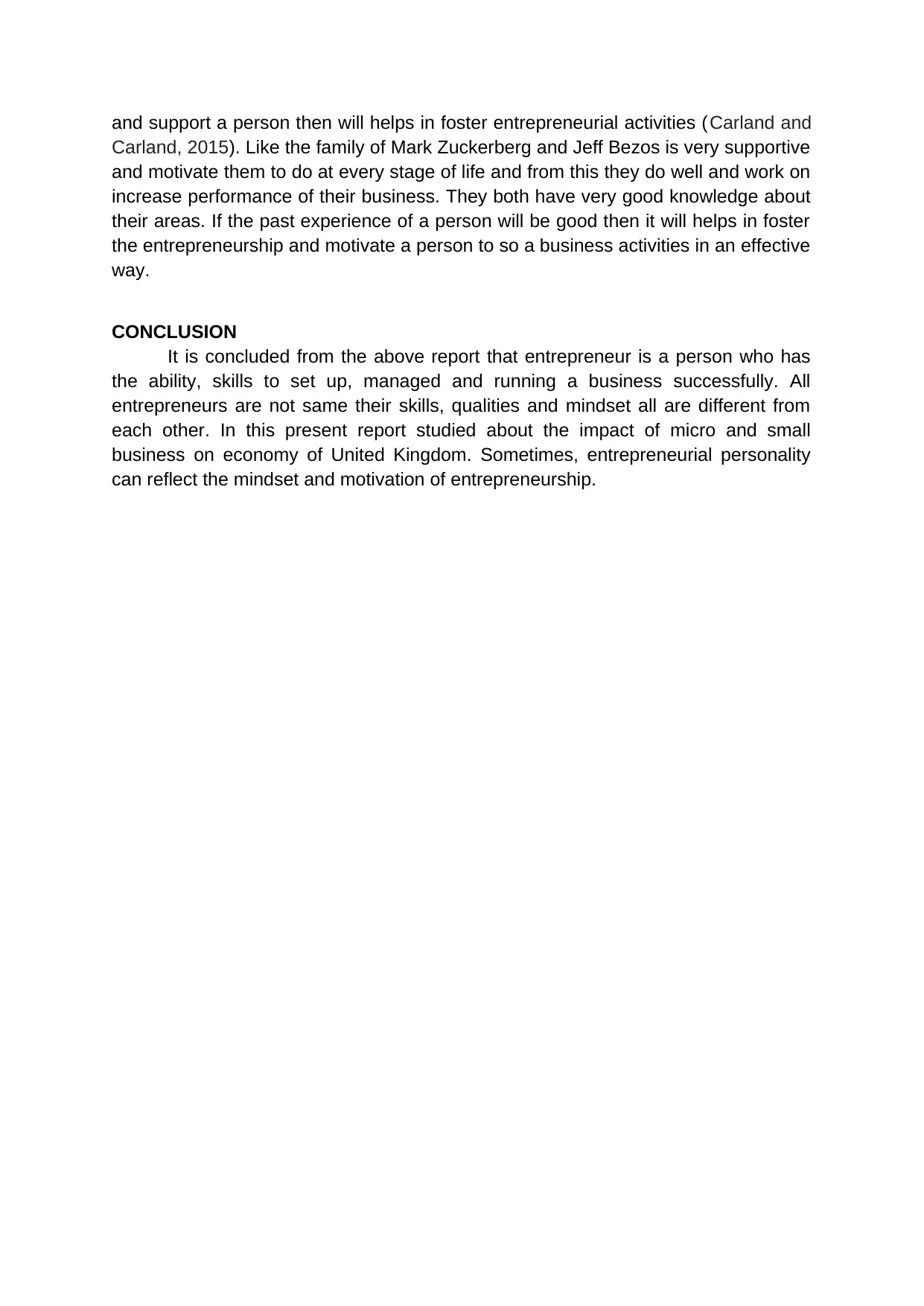
and support a person then will helps in foster entrepreneurial activities (Carland and
Carland, 2015). Like the family of Mark Zuckerberg and Jeff Bezos is very supportive
and motivate them to do at every stage of life and from this they do well and work on
increase performance of their business. They both have very good knowledge about
their areas. If the past experience of a person will be good then it will helps in foster
the entrepreneurship and motivate a person to so a business activities in an effective
way.
CONCLUSION
It is concluded from the above report that entrepreneur is a person who has
the ability, skills to set up, managed and running a business successfully. All
entrepreneurs are not same their skills, qualities and mindset all are different from
each other. In this present report studied about the impact of micro and small
business on economy of United Kingdom. Sometimes, entrepreneurial personality
can reflect the mindset and motivation of entrepreneurship.
Carland, 2015). Like the family of Mark Zuckerberg and Jeff Bezos is very supportive
and motivate them to do at every stage of life and from this they do well and work on
increase performance of their business. They both have very good knowledge about
their areas. If the past experience of a person will be good then it will helps in foster
the entrepreneurship and motivate a person to so a business activities in an effective
way.
CONCLUSION
It is concluded from the above report that entrepreneur is a person who has
the ability, skills to set up, managed and running a business successfully. All
entrepreneurs are not same their skills, qualities and mindset all are different from
each other. In this present report studied about the impact of micro and small
business on economy of United Kingdom. Sometimes, entrepreneurial personality
can reflect the mindset and motivation of entrepreneurship.
⊘ This is a preview!⊘
Do you want full access?
Subscribe today to unlock all pages.

Trusted by 1+ million students worldwide
1 out of 14
Related Documents
Your All-in-One AI-Powered Toolkit for Academic Success.
+13062052269
info@desklib.com
Available 24*7 on WhatsApp / Email
![[object Object]](/_next/static/media/star-bottom.7253800d.svg)
Unlock your academic potential
Copyright © 2020–2026 A2Z Services. All Rights Reserved. Developed and managed by ZUCOL.




